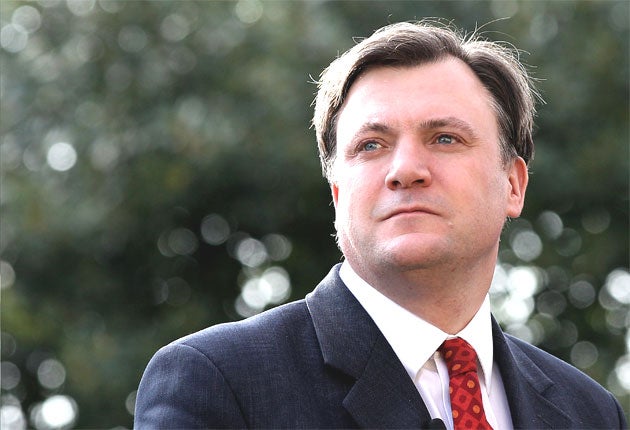Ed Balls joins race for Labour leadership

Your support helps us to tell the story
From reproductive rights to climate change to Big Tech, The Independent is on the ground when the story is developing. Whether it's investigating the financials of Elon Musk's pro-Trump PAC or producing our latest documentary, 'The A Word', which shines a light on the American women fighting for reproductive rights, we know how important it is to parse out the facts from the messaging.
At such a critical moment in US history, we need reporters on the ground. Your donation allows us to keep sending journalists to speak to both sides of the story.
The Independent is trusted by Americans across the entire political spectrum. And unlike many other quality news outlets, we choose not to lock Americans out of our reporting and analysis with paywalls. We believe quality journalism should be available to everyone, paid for by those who can afford it.
Your support makes all the difference.Former children's secretary Ed Balls today declared he was standing in the Labour leadership contest, saying the party needed to listen to the public.
Mr Balls visited Labour supporters at a Sure Start centre in Netherfield, Nottingham, to launch his campaign to become the party's next leader.
Mr Balls - long regarded as Gordon Brown's closest lieutenant in the Cabinet - is being supported by former schools minister Vernon Coaker.
Mr Coaker, the MP for Gedling in Nottinghamshire, worked under Mr Balls, 43, in the final months of Labour's Government.
He joins left-winger John McDonnell and brothers David and Ed Miliband - the former foreign and energy secretaries - in the race for the Labour crown.
Mr Balls said: "It's really important that we don't just talk to ourselves. We have got to hear what the public have got to say.
"We have to listen first and hear what the public have to say. It's important that we are a campaigning party but also a listening party."
Mr Balls is also supported by Michael Dugher, Gordon Brown's former spokesman and newly-elected MP for Barnsley East, and Sharon Hodgson, the Labour MP for Washington and Sunderland West.
Mr Balls said he told Mr Brown earlier of his decision to stand.
He said: "Gordon should stay completely neutral in this. I told him I was going to stand and he said 'Good luck, go for it'."
As part of his campaign, the former Cabinet minister said he wanted to lead a "tough and decisive" opposition, as well as improving the way Labour communicated its policies, especially on the issue of immigration.
Changes to Labour's policy on university tuition fees and welfare state reform could also be on the cards if Mr Balls wins the contest, which comes to a conclusion at the Labour Party conference in Manchester in September.
Yesterday, Labour's ruling national executive committee (NEC) announced the contenders would face a lengthy four-month contest.
But the NEC sparked anger by announcing that, despite the long campaign, would-be candidates have only until next Thursday to collect the 33 nominations from MPs required to get their names on to the ballot paper.
Mr McDonnell failed in an attempt to stand against Mr Brown in 2007 because he could not secure enough nominations, and said the short timetable to do so this time was a "fix" biased towards the Labour hierarchy's favoured candidates.
With many MPs on the Labour benches fresh to Parliament after being elected for the first time last week, the Hayes and Harlington MP said it would take time to establish their political leanings and recruit like-minded colleagues.
"It prevents rank-and-file party members having any say over the process. Labour MPs will have no real opportunity to consult their local parties and constituency parties will have no time to meet," he said.
"We thought that New Labour had learnt its lesson from the coronation of Gordon Brown and wanted a genuinely democratic process this time round.
"By curtailing the nomination process so drastically in this way, the whole process is being discredited from the start."
Under the NEC timetable, leadership hustings will take place during June and July. Balloting will begin on August 16 and run through to September 22.
The outcome of the election - through Labour's system of electoral colleges comprising MPs, party members and the trade unions - will be announced at the start of the conference three days later.
Former home secretary Alan Johnson, who is backing David Miliband, complained that the contest was too long and would distract attention from the job of opposing the new coalition Government.
"I don't think we should spend months and months examining our navels," he said.
But Harriet Harman, who took over as acting leader following Mr Brown's resignation last week, insisted it would be an "open, engaging and energising" contest.
"It is going to be a very important opportunity for us to reflect on the result of the general election, to renew the Labour Party and to re-engage with the British people," she said.
She said the party would be actively encouraging new members to sign up so they could have a vote in the election.
"We're asking people to join us and to help shape the progressive future of this country by joining the Labour Party so that they too can play their part in this great election campaign," she said.
Join our commenting forum
Join thought-provoking conversations, follow other Independent readers and see their replies
Comments